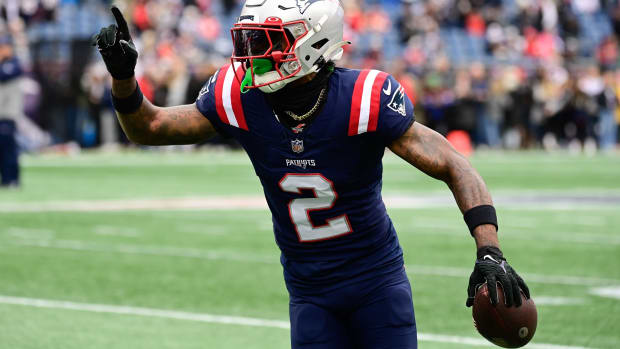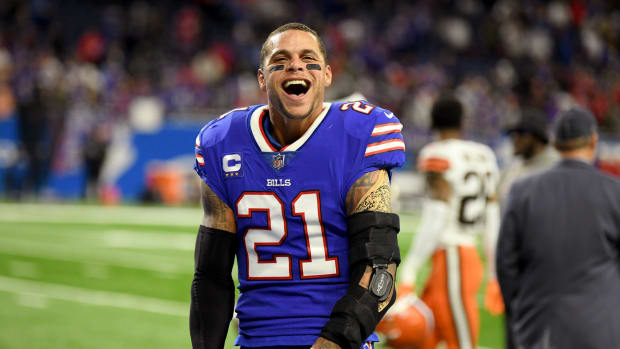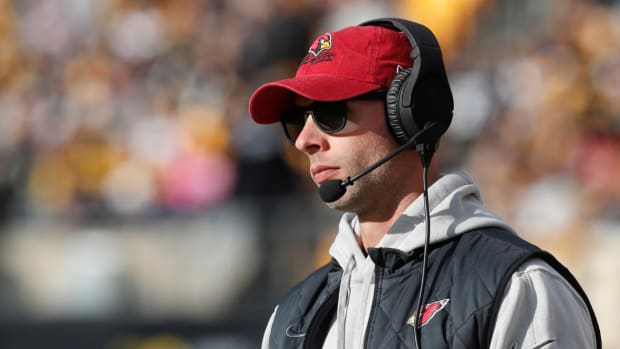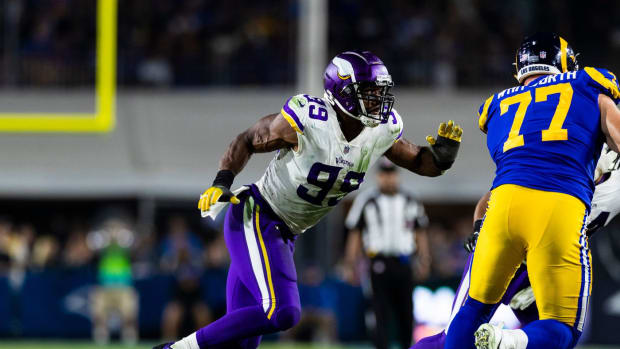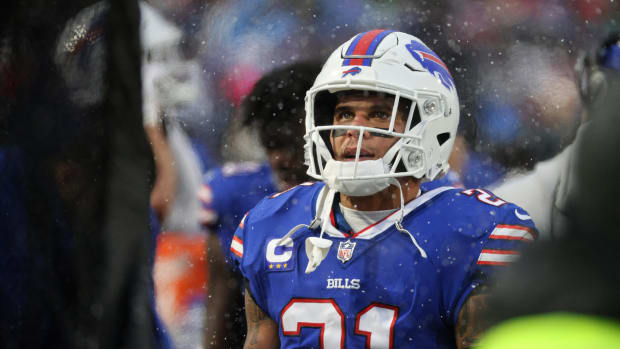Panthers’ Defense Thriving Under Steve Wilks and His Blitz-Heavy Ways
CHARLOTTE — Steve Wilks, the Panthers’ first-year defensive coordinator, will blitz the hell out of you.
In last week’s win against Minnesota, Carolina blitzed or heavily spied on Case Keenum on 28 of his 55 dropbacks, sacked him six times and forced a fumble and interception. The Panthers blitz on 43% of their defensive snaps, according to data compiled by Pro Football Focus, which ranks second in the league this year and nearly doubles the blitzing rate Carolina was employing before Wilks took over (the highest rate before Wilks came in 2013 when the Panthers blitzed 26.3% of the time). And Carolina is blitzing 50% of the time on third down while the league average over the past year as been 35.6%.
After six years of Sean McDermott’s zone coverage defense that emphasized corners tackling and keeping everything in front you, the 2017 Panthers’ defense is a completely different vision—one that is fully Wilks’s.
“Wilks is aggressive, man,” veteran cornerback Captain Munnerlyn says. “He’s not believing in sitting back and let you dink and dunk us. We’re going to come after you.”
While this might be Carolina’s most aggressive defense in recent memory, it’s not the greatest, especially when compared to the 2015 Panthers unit that had 43 sacks (sixth in the league) and 24 interceptions (best in the NFL). The back seven isn’t as elite as it once was—Luke Kuechly has missed time with a concussion and has had a handful of uncharacteristic missed tackles while linebacker Thomas Davis has been hampered by a hamstring injury. The defensive backfield has produced just four interceptions this season and the team’s seven overall picks are tied for 27th.
But the defensive line may be as stout as it’s ever been under Ron Rivera. Already the Panthers have 40 sacks this season with nine-and-a-half each coming from Carolina’s own Julius Peppers and under-the-radar defensive end Mario Addison. Their performances have overshadowed six sacks from Kawann Short, still one of the best defensive tackles in the game.
Carolina ranks fifth in total defense and tenth in scoring defense with Wilks running the show this year, after having virtually no drop-off once McDermott left. However all of the Panthers’ success brings up a point of worry. Will Wilks be plucked by another team at the end of this season, forcing Carolina to move on to its third defensive coordinator in three years?
Wilks interviewed with the Rams last year, and he’s expected to field more requests this season. He’s already been linked to the Giants, especially if former Panthers GM Dave Gettleman lands that gig. Surely he’ll get calls, and he’s likely to take defensive line coach Eric Washington along with him if he gets a job.
He’s been grooming himself for that head job, too. On Monday, as he’s done all this season, he addressed the assembled media in the press conference room while speaking at the podium with notes. His predecessor also prepared notes, but the talk was slightly less formal with media members huddling around the podium rather than being seated.
“The thing I’m going to say right now,” Wilks started, addressing any coaching rumors, “I’m going to tell you the same thing I tell the players. Let’s stay focused on being focused. I’m not really going to entertain it or talk about it at this particular time. The biggest thing we have this week is Green Bay and that’s going to be my focus right now. Whatever’s going to happen at the end of the year is going to happen.”
When pressed, Wilks did admit: “I think it’s always good when you have the opportunity to get in front of anybody and just sell yourself.”
Wilks didn’t have to sell himself to Rivera in the winter when McDermott jumped to Buffalo. The two of them go back to 2006 when Rivera was the Bears’ defensive coordinator and Wilks joined as the defensive backs coach from the college ranks. They spent three years in Chicago before Wilks followed Rivera to San Diego where they maintained their respective roles for the Chargers for another two seasons. The Panthers hired Rivera in 2011 and a year later Wilks joined him as the defensive backs coach.
If you do the math, that makes 11 of 12 straight years of coaching together, and that background helps Rivera feel more comfortable with what Wilks is doing as a play-caller.
“I think the biggest thing everyone has to understand is, the system’s in place,” Rivera said. “What we’ve done, we’ve been doing for seven years. Every year it gets refined and it takes on the personality of that season. It also takes the personality of the play-caller. Steve’s very aggressive, and he’s a guy that’s looking for opportunities and ways to do things. I think that’s a big part of it, is it’s taking on his personality and who he is.”
By no means has this defense been lights-out lately. Carolina hasn’t held an opponent to under 20 points since Week 9 and it struggled against both the Jets and Saints (where they missed no fewer than 12 tackles) in consecutive weeks before bouncing back against the Vikings.
But no running back has rushed for 100 or more yards in a game since last December, a stretch of 17 straight games that is the third-longest streak in the league. At 89.5 rushing yards per game, the Panthers are tied for third in the NFL with the Broncos for the best rushing defense.
After two big NFC tilts, there are two more in the next three weeks for Carolina. Aaron Rodgers comes to town Sunday in his return from shoulder surgery in an effort to get Green Bay back into the playoffs for the ninth straight year And the season finale in Atlanta could very well decide the NFC South and playoff seeding for the two most recent NFC champions.
“I think we have a championship-caliber team, but it really boils down to us continuing to compete and play the way that we played today,” Davis says after the Minnesota win. “We can’t go out and have games like we had last week in New Orleans and think that we’re going to be a championship-caliber team. A championship-caliber team is consistent, and that’s one of the things we’re working toward becoming.”

































